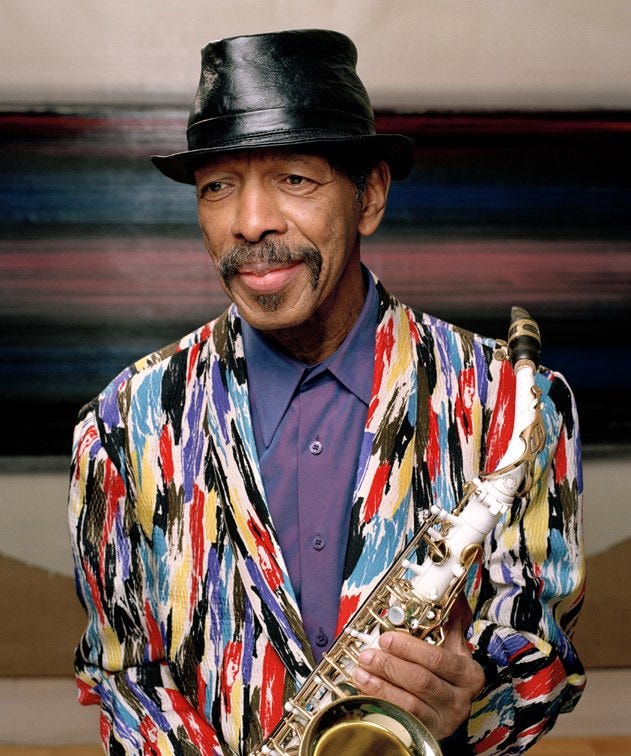
There exists, for everyone, a sentence—a series of words—that has the power to destroy you. (Philip K. Dick)
I.
Is there an utterance that could unmake you?
Is there a string of syllables that could shatter you?
Is there an idea or fact so incongruent with your model of reality—so violently discordant with everything you know to be true—that learning it would unravel you?
II.
Born and raised in Fort Worth, Texas, Ornette Coleman taught himself to play the saxophone when he was a teenager after being kicked out of the marching band for improvising. Though he would come to be regarded as a fearless innovator and one of the most beloved figures in jazz history, he was initially regarded by many of his peers as a fraud. The reason was that he never really got the hang of Western musical theory. Instead, he just developed his own.
Harmolodics is a musical philosophy and method of musical composition and improvisation developed by American jazz saxophonist-composer Ornette Coleman. It is associated with avant-garde jazz and free jazz, although its implications extend beyond these limits.
Harmolodics seeks to free musical compositions from any tonal center, allowing harmonic progression independent of traditional European notions of tension and release. Harmolodics may loosely be defined as an expression of music in which harmony, movement of sound, and melody all share the same value. The general effect is that music achieves an immediately open expression, without being constrained by tonal limitations, rhythmic pre-determination, or harmonic rules. (Wikipedia)
Jazz pianist/critic Ethan Iverson calls him “the mystic of melody”:
Harmolodics require each individual in the ensemble to participate and create. Not every note needs to be 100% parallel, it is up to the performers to edit according to taste. (Sometimes it sounds better to play a given pitch as a sharp or as a flat.) On “What Reason Could I Give” there is one tiny glorious moment of counterpoint, when Don Cherry moves from G to Ab, while the rest of the horns hold F and C. It happens both times through the tune. The use of Harmolodics can access a kind of emotion that is breathtakingly pure, as long as everyone makes the right decisions to serve the music and performs with an open heart.
In the end, Harmolodics was part of a search for something spiritually different than the average professionally notated score. When Ornette told me about studying some scores of European music, such as Beethoven, he said it was pretty good music. But he could hardly believe that the players in the orchestra couldn’t change their notes to go with they way they felt.
Again, the above is mostly educated guesses. If someone shows up and tells me I’m wrong accompanied with some kind of definitive evidence I would immediately defer to their wisdom.
However, I would stake all my money on a simple precept: Harmolodics honors melody above all.
Melody is Ornette’s greatest gift.
As Iverson alludes to, Harmolodics was notoriously difficult to understand. Its fundamental precepts and conception of composition were so different that one was never quite sure they grasped it.
As Coleman rose to prominence, he began to face criticism for being difficult to work with because of his inability to read and write music. Composer and jazz musician Gunther Schuller tells Iverson the story of what happened when he tried to teach Coleman.
GS: Well, you probably don’t know the story about my trying to, at his request, to teach him how to read and write music.
EI: What happened there?
GS: You know, it’s not just that he can’t read music, but he also can’t write it, and almost all of his music, particularly that Philadelphia piece, that big orchestral piece, all of his music had to finally be notated by other people, because he had a problem related to dyslexia. He read all the notes in the saxophone instruction books—the alto saxophone is written in E flat, so it’s a sixth off from the note that’s actually being heard. And he got those upside down. And then he also formed some ideas like, an F# whatever that might be, the written F# or the notated F#, who knows, an F# is always an upbeat. Or a B-flat, well it may not be B-flat, I don’t remember, it may not be, but some pitch is something else and that’s the only way you use it, it’s almost like talas or something. And it wasn’t very consistent, but he had these notions. So between all of that he could not write. I know the people who wrote his music, one of them was my secretary for five years, she wrote out half of his pieces. They did that by listening to him play what he wanted.
So, anyway…so Ornette finally, let’s see, when was this? Maybe ’61, I don’t know, I have to look it up, somewhere in the early 1960s, after we’d worked together many times, one day, and he’s always so quiet and soft-spoken, he let me know that he was very frustrated with his inability to read and write music swiftly. And I said, “Well, listen, maybe I can help you.” I would never have suggested it myself but when it came from him…. So now he came to my house. He did very little traveling in those days, partly because he overpriced himself as we all know so that the other things that he would have wanted he never got to do. Anyway, so that meant that he was in New York all the time, and he came to New York to my house on 60 90th St, Western Avenue, every Wednesday afternoon for almost a year. And I’m a pretty good teacher and I’m also fairly persuasive and I’m good in the sense that if there’s a real problem I find ways of getting around that problem, you know. Well, [laughs] in his case I was not successful. And I tried all kinds of things, but this mental block in his mind where the notes were always upside down from what they really were, just was such a severe block I could not break through that. And I got more and more frustrated and I wanted so much to help him with that, and one day he came, and he was religious about this—you know, that in itself is something amazing, coming every Wednesday for nine months or something like that—and that time it all blew up. I don’t remember what it is I said, but I evidently said something that was like a tremendous breakthrough in his brain about this whole question. I wish I knew what I said. But he suddenly…if a black man can turn white, he turned white, and he started to throw up, and he went to the bathroom and luckily it was only about 20 feet away, and he went in there and he just emptied himself out. He had some kind of paroxysm experience. He came out of there totally destroyed, he couldn’t talk and Margie my wife was hysterical, she thought that, “What’s happening, we have to take him to a hospital or something.” And he just stayed in the living room and sat there for 20 minutes not saying a word and eventually left, and then I didn’t see him ever again about that. It was the most horrifying experience, and also one of the most frustrating.
EI: Wow… interesting.
GS: But it doesn’t matter because when he plays, he plays what he hears, and so he doesn’t have to write music.
EI: That’s right.
Musicologist Phil Ford (of the excellent Weird Studies podcast) adds some color to the story in a recent episode (starting around an hour and 25 minutes in):
“Schuller told the story of how he came over every week for music lessons but he just kept coming up against this epistemic limit, like a kind of solid wall, where they just couldn’t agree on the most basic concepts of music theory. Until one day, Schuller said something and Coleman was like, “wait a minute, so you mean blah” (he didn’t remember what it was) and Schuller was like yeah that’s exactly what I mean. And Schuller says there was this indescribable look of horror on his face; I imagine one of those hapless characters in a Lovecraft story when they finally see the True Reality”.
In Ford’s telling, it would seem that the precipitating event was Coleman’s understanding of a correspondence which finally demonstrated how fundamentally and irrevocably at odds his musical philosophy was with that of the conventional Western system.
III.
There is more to the Philip K. Dick quote:
There exists, for everyone, a sentence—a series of words—that has the power to destroy you. Another sentence exists, another series of words, that could heal you. If you're lucky you will get the second, but you can be certain of getting the first.
Is there a sentence that could dissolve the cynical crust which has enclosed you for so long? Is there an phrase with the power to make you anew?
IV.
I watched Won't You Be My Neighbor? a few days ago, a documentary about the life and guiding philosophy of Fred Rogers (a.k.a. Mr. Rogers). I cried like a baby throughout; his tenderness, innocence, and steadfast dedication to helping children was truly awe-inspiring. The man was too good for this world.
One part of the documentary stood out—an absolutely stupendous event from Mr. Roger’s life, the closest thing I've ever seen to a “sentence” (in this case a speech and a recitation of song lyrics) that could “heal”.
During the heat of the Vietnam War and budget woes, President Richard Nixon intended to slash federal funding toward public television in half. Rogers had a different vision for the future of public television.
I recommend that you just watch the video of his congressional testimony (don’t be a cynical bastard and bail because it starts slow), but here are some passages that describe what happened if you’d rather read.
Subcommittee chairman, Senator John Pastore (D-RI), unfamiliar with Fred Rogers, is initially abrasive toward him. Over the course of Rogers’ six minutes of testimony, Pastore’s demeanor gradually transitions to one of awe and admiration as Rogers speaks.
After his firm, yet tender speech, Rogers asked for permission to recite the words from one of the show’s songs:
What do you do with the mad that you feel / When you feel so mad you could bite? / When the whole wide world seems oh so wrong / And nothing you do seems very right. / What do you do? Do you punch a bag? / Do you pound some clay or some dough? / Do you round up friends for a game of tag / Or see how fast you go? / It’s great to be able to stop / When you’ve planned the thing that’s wrong / And be able to do something else instead / And think this song.
I can stop when I want to / Can stop when I wish. / Can stop, stop, stop anytime. / And what a good feeling to feel like this / And know that the feeling is really mine. / Know that there’s something deep inside / That helps us become what we can. / For a girl can be someday a lady / And a boy can be someday a man.
Pastore, jaw leaning in hand, let down his guard as he listened to Rogers’ lyricism.
“Well, I’m supposed to be a pretty tough guy, and this is the first time I’ve had goosebumps for the last two days,” Pastore said. “I think it’s wonderful, just wonderful. Looks like you just earned the $20 million.”







A great read, thanks for this :)
“Ships at a distance have every man's wish on board.” I’ll never forget it. It was days before I could read the rest of the book.